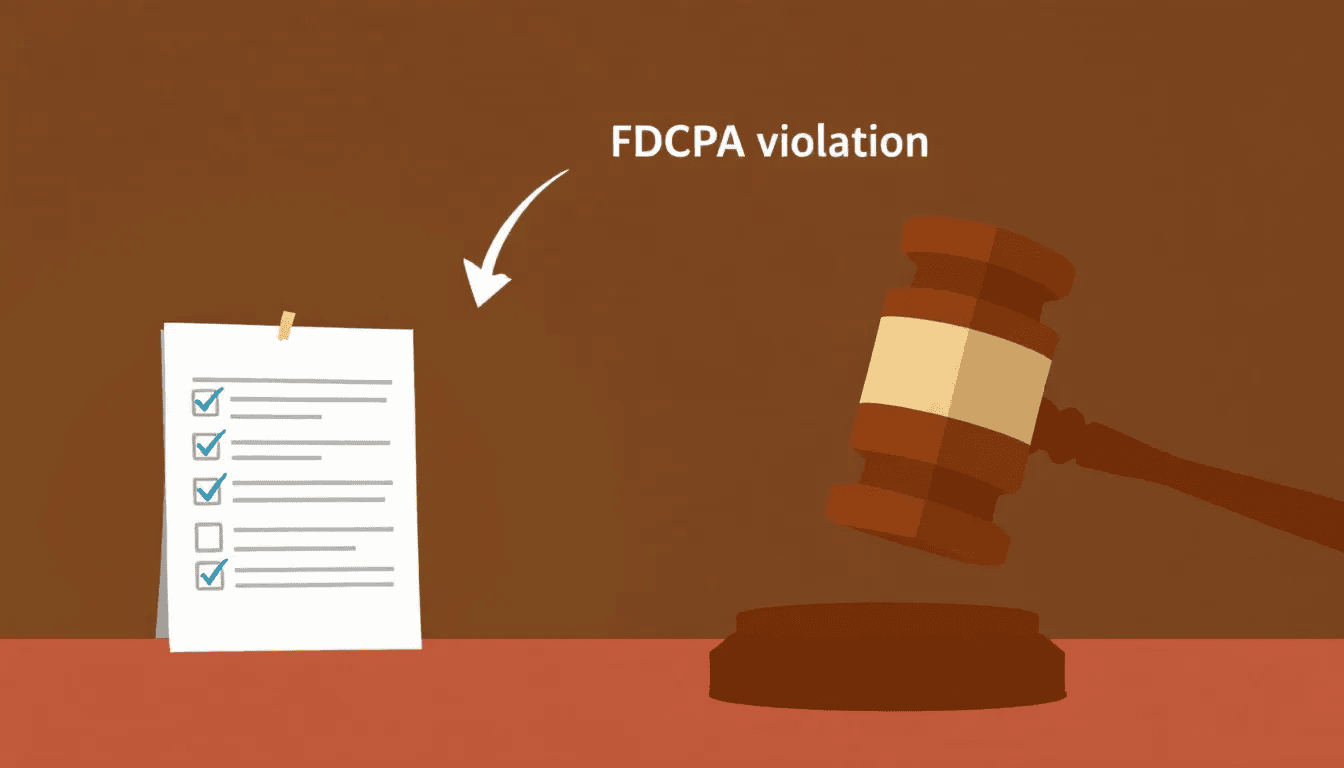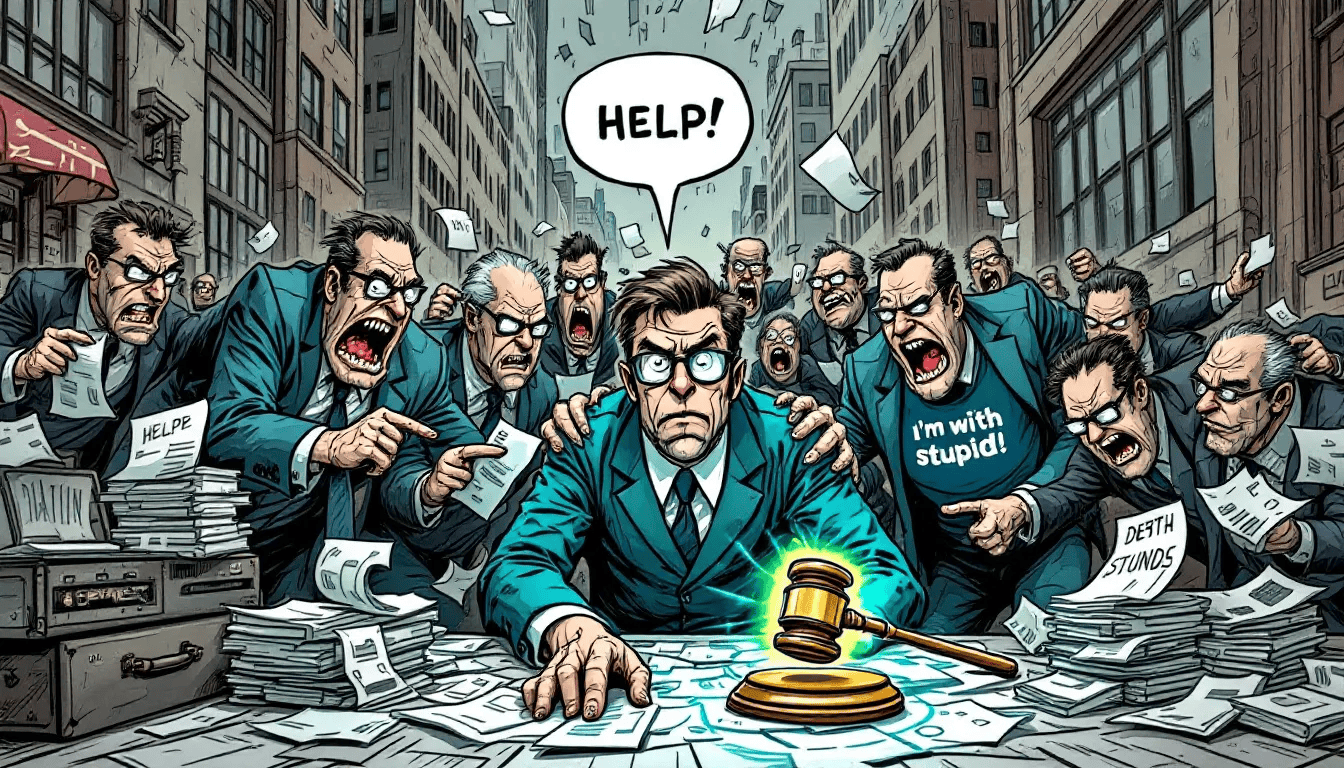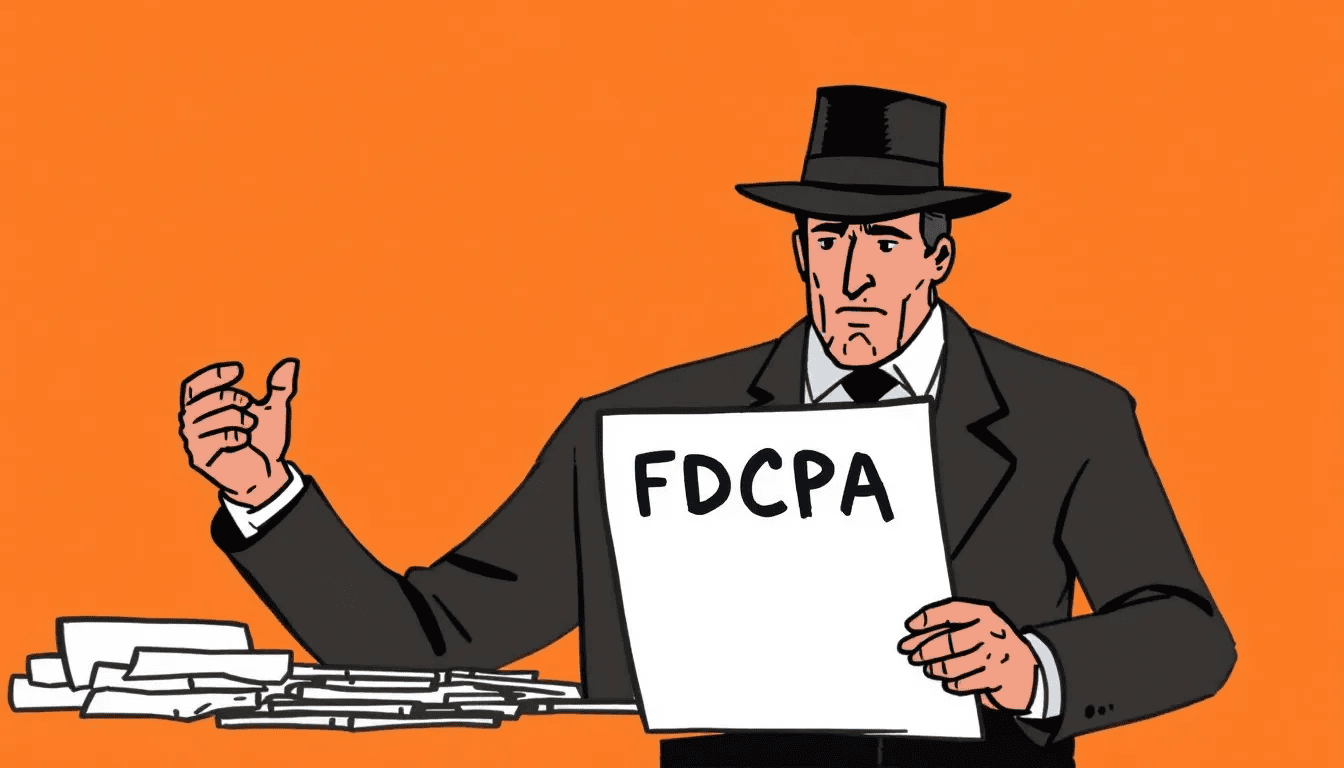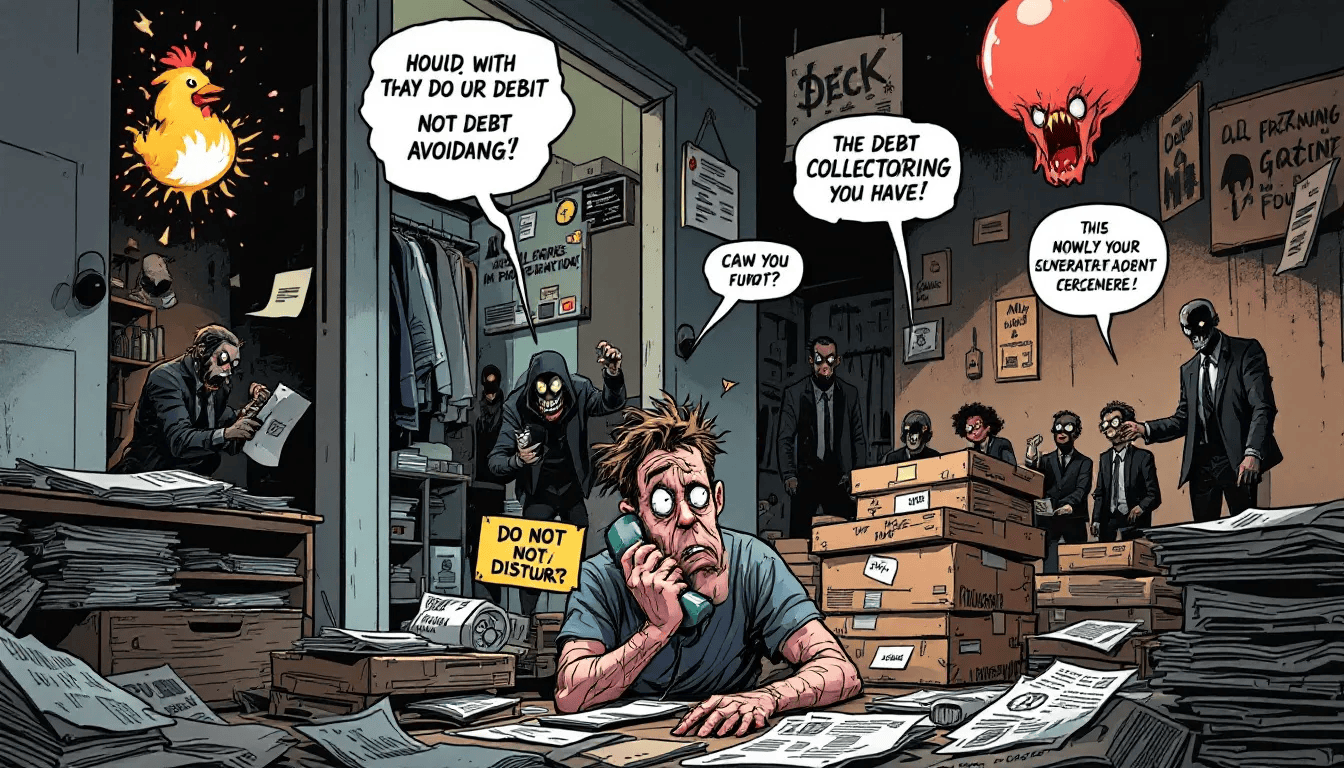Are you dealing with aggressive debt collectors and wondering if their actions are illegal? This article will help you understand what counts as FDCPA violations, empowering you to recognize and act against unlawful debt collection practices.
Key Takeaways
The FDCPA prohibits debt collectors from engaging in abusive, unfair, or deceptive practices, including harassment and false representations.
Consumers have the right to dispute debts and request validation, halting collection efforts until their request is addressed.
If a debt collector violates the FDCPA, consumers can take legal action to recover damages, report violations to regulatory agencies, and refuse further contact.
What Constitutes an FDCPA Violation?

The Fair Debt Collection Practices Act (FDCPA) is designed to protect consumers. It prohibits debt collectors from engaging in abusive, unfair, or deceptive practices while attempting to collect debts. This federal law specifically aims to protect debtors from third-party debt collectors, ensuring they adhere to strict guidelines during the debt collection process. Understanding these violations helps you recognize when a debt collector has overstepped their bounds, empowering you to take action.
Debt collectors must follow specific rules when attempting to collect debts. Harassment, such as threats and intimidation, is strictly prohibited. Additionally, any misrepresentation of the amount owed or the debt collector’s legal authority to take certain actions, such as seizing property, is considered a violation of the FDCPA. These rules are in place to ensure that debt collection practices remain fair and transparent.
Using deceptive means to collect a debt or obtain consumer information is also a violation of the FDCPA. For example, failing to disclose that a communication is for debt collection purposes or falsely threatening legal action that cannot be pursued are clear breaches of the law. Understanding these violations helps you recognize when a debt collector has overstepped their bounds, empowering you to take action.
Recognizing Harassment by Debt Collectors
Harassment by debt collectors can take many forms, all of which are aimed at causing distress to the debtor. Actions that threaten physical harm or use language that can be seen as threatening or coercive are clear violations of the FDCPA. For instance, threats of incarceration for unpaid debts, despite being unfair practices, are unfortunately common tactics used by some debt collectors. Such actions are not only unethical but also illegal.
Specific behaviors, such as using obscene or profane language during communication, are considered harassment under the FDCPA. Debt collectors are prohibited from making repetitive phone calls intended to annoy or abuse the debtor. Imagine receiving calls every hour throughout the day—this is not only stressful but also a clear case of harassment. Identifying these behaviors allows you to take the necessary actions to safeguard your rights.
Keep records of every phone call, letter, and email to address harassment and prove legal violations. Keep records of every phone call, letter, and email. This documentation can serve as critical evidence if you need to file a complaint or take legal action. Staying informed and vigilant helps protect you from abusive practices and uphold your rights.
False or Misleading Representations
False or misleading representations by debt collectors are a serious violation of the FDCPA. Debt collectors are strictly forbidden from making false statements about the amount owed or the legal consequences of not paying. For example, claiming that you owe more than you actually do or suggesting that non-payment will lead to immediate legal action can be both deceptive and intimidating.
Debt collectors cannot misrepresent themselves as attorneys or government officials to pressure you into paying. Imagine receiving a letter that appears to be from a lawyer or a government agency—it would likely cause unnecessary panic. Such deceptive practices in the debt collection business are not just unethical; they are illegal under the FDCPA.
Providing false information about debts and using deceptive methods to collect them are also violations. This includes claiming to be affiliated with government entities or using fake documents that look like official court communications. Recognizing these tactics enables you to challenge false representations and safeguard your rights.
Unfair Debt Collection Practices

Unfair practices in debt collection go beyond harassment and false representations. These practices include imposing unauthorized charges and using deceptive forms designed to trick consumers. Debt collectors are not allowed to add additional charges to your debt unless they are specified by your contract or permitted by law. This ensures that you are not unfairly burdened with extra costs.
Communication methods used by debt collectors are also subject to strict regulations. For instance, using symbols or language on envelopes that indicate a debt collection purpose is not permitted. Additionally, if you make a payment towards multiple debts, debt collectors must apply the payment as directed by you and cannot arbitrarily apply it to disputed debts. These rules are in place to protect consumers from deceptive and unfair practices.
Debt collectors are restricted from sending emails to your work address unless specific exceptions apply. This helps prevent your workplace from becoming a battleground for debt collection. Understanding these unfair practices helps you ensure debt collectors follow the law.
Communication Violations in Debt Collection
Communication violations are a common issue in debt collection. Debt collectors cannot contact you at inconvenient times or places, such as during late hours or at your workplace if you have requested them not to. Specifically, they are not allowed to call before 8 AM or after 9 PM, local time. These restrictions are designed to protect your privacy and prevent undue stress.
Debt collectors are also prohibited from disclosing your debts to unauthorized individuals, such as relatives or neighbors. They must follow specific rules when contacting third parties for location information about you. Ensuring the privacy of your debt information is a key aspect of the FDCPA, preventing embarrassment and additional stress.
Using illegal communication methods, such as sending documents that misrepresent themselves as official court or government communications, is strictly prohibited. This includes collecting debts through public social media posts or using postcards for communication. Debt collectors must also identify themselves when making contact, and failing to do so constitutes harassment. Knowing these rules helps you identify when a debt collector has violated them.
Consumer Rights to Dispute Debts
Consumers have the right to dispute debts, and understanding this process is crucial for protecting yourself. You have the right to request validation of the debt, which includes receiving detailed information about the debt, such as the creditor’s name and the total amount owed. This information should be provided to you in writing, ensuring transparency in the debt collection process.
After receiving validation information, you have one month to formally dispute the debt. If you dispute the debt, the debt collector must stop collection efforts until the validation request is addressed. This pause provides you with the necessary time to review the debt and ensure its accuracy without the pressure of ongoing collection efforts.
Debt collectors must clearly state that their communication is from a debt collector and include their contact information. They must also include a statement that the debt is disputed within 30 days of the debt notification. Being aware of your rights to dispute debts empowers you to challenge inaccuracies and ensure legal compliance by debt collectors.
Legal Recourse for FDCPA Violations

If a debt collector violates the FDCPA, you have the right to take legal action. This can include filing lawsuits to recover damages caused by the violation. The FDCPA allows for consumers to seek statutory damages up to $1,000 in individual lawsuits, which can help compensate for the distress caused by the violation.
In addition to statutory damages, if a debt collector is found guilty of violating the FDCPA, they may be ordered to pay your attorney fees and court costs. This ensures that you are not financially burdened by the legal process. The Federal Trade Commission (FTC) can also take enforcement actions against debt collectors who violate the FDCPA. This dual approach of civil liability and regulatory enforcement helps hold debt collectors accountable.
You have one year from the date of the violation to file a lawsuit under the FDCPA. You can report violations or sue in state or federal court. Being aware of your legal recourse options equips you to combat unlawful debt collection practices and defend your rights.
Reporting FDCPA Violations – Sue Debt Collector Who Violates FDCPA
Reporting FDCPA violations holds debt collectors accountable for their actions. If you think a debt collector has broken the FDCPA, you can take action. Report the violation to the State Attorney General’s office, the Federal Trade Commission (FTC), and the Consumer Financial Protection Bureau (CFPB). These agencies are responsible for enforcing the FDCPA and can take action against violators.
If debt collectors do not cease contact after a written request, you can file complaints with federal agencies like the FTC. Reporting violations helps protect your rights and ensures that debt collectors follow the law. Document all interactions with debt collectors and provide detailed information in your complaint to support your case.
Reporting FDCPA violations helps enforce fair debt collection practices and protect other consumers from abusive tactics. Your actions can lead to investigations and penalties against violators, promoting a fairer debt collection environment for everyone. Ultimately you can just sue them and claim damages under the law which will help get your debt discharged, get your attorney paid, and get you up to $1000.
Preventing Further Contact from Debt Collectors

If you wish to stop a debt collector from contacting you, you can notify them in writing that you refuse to pay the debt or wish to cease communication. Such a request mandates the debt collector to cease contact under the FDCPA. Send the letter via Certified Mail and request a return receipt to ensure your request is legally recognized.
Keep a record of your request to stop communication. Make a copy of the letter for your records, send the original by certified mail, and pay for a return receipt. This provides legal proof that you have requested the debt collector to stop contacting you. Do not acknowledge that you owe the debt in any written communication. This is crucial to remember. Admitting the debt could be used against you in future legal proceedings.
If contact continues after your written request, the debt collector is violating the FDCPA, allowing you to take debt collector’s further efforts. Understanding how to prevent further contact from debt collectors gives you control over your interactions and protects your rights against harassment.
Summary
Navigating the complexities of the Fair Debt Collection Practices Act (FDCPA) can seem daunting, but understanding your rights and the protections available to you is essential. From recognizing harassment and false representations to knowing how to dispute debts and take legal action, each aspect of the FDCPA is designed to protect consumers like you from abusive debt collection practices. By familiarizing yourself with these rules, you can safeguard your financial and emotional well-being.
The FDCPA provides a robust framework that limits the actions debt collectors can take, ensuring they cannot use unfair, deceptive, or abusive methods to collect debts. Whether it’s stopping unwanted communication, disputing inaccurate debts, or seeking legal recourse, the FDCPA empowers you to take control of your financial interactions. Reporting violations and understanding your rights to dispute debts can prevent further harassment and hold debt collectors accountable.
Ultimately, knowledge is power. By educating yourself about the FDCPA and its provisions, you can confidently navigate debt collection challenges and protect your rights. Remember, you are not alone—numerous resources and legal protections are available to help you. Stay informed, stay vigilant, and take control of your financial future.
Frequently Asked Questions
For more FAQ go here: https://www.blgwins.com/fdcpa-violations-faq/
What should I do if a debt collector is harassing me?
If a debt collector is harassing you, it is essential to document all interactions and report the harassment to the State Attorney General’s office, FTC, and CFPB. This will help protect your rights and may lead to appropriate action against the collector.
Can a debt collector contact me at my workplace?
Debt collectors cannot contact you at your workplace if you formally request them not to do so in writing. It is important to assert your rights in this matter.
How can I dispute a debt?
To dispute a debt, you must request validation within 30 days of receiving information about the debt, halting collection efforts until the dispute is resolved. Ensure to document your communication for your records.
What legal actions can I take if a debt collector violates the FDCPA?
You can file a lawsuit within one year of the violation under the FDCPA, seeking statutory damages, attorney fees, and court costs. Additionally, reporting the violation to federal agencies such as the FTC is recommended.
How can I stop a debt collector from contacting me?
To stop a debt collector from contacting you, send a written request via Certified Mail, asking them to cease communication, as they are legally obligated to honor this under the Fair Debt Collection Practices Act (FDCPA).